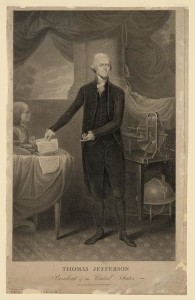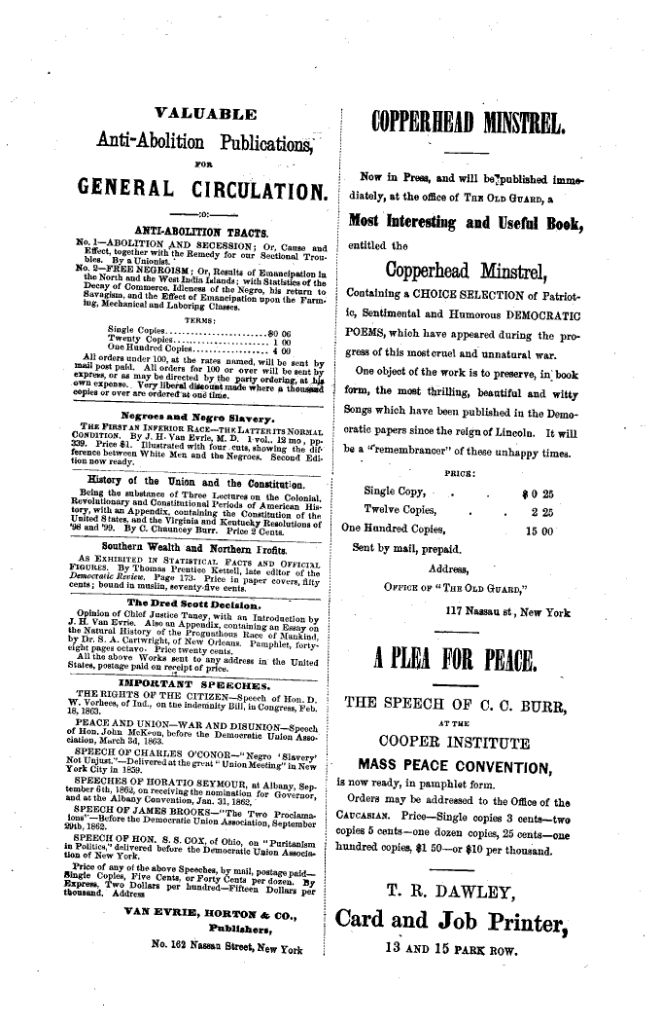The Old Guard, a pro-slavery, antiwar monthly journal published in New York found historical precedent for anti-Lincoln Copperheads in three iconic Americans – George Washington, Andrew Jackson, and Thomas Jefferson. Here’s the paragraph on Jefferson.
From the July 1863 issue of The Old Guard:
Jefferson a Copperhead.
All who now oppose the opinions of the Administration are called traitors, and all who know enough to distinguish between government and the illegal acts of government are called Copperheads. Just such a Copperhead was Jefferson, for he declared that “Treason, when real, merits the highest punishment. But codes extend their definition of treason to acts not really against one’s country. They do not distinguish between acts against the government and acts against the oppressions of the government; the latter are virtues: yet have furnished more victims to the executioner than the former, because real treasons are rare – oppressions frequent. The unsuccessful strugglers against tyranny have been the chief martyrs of treason laws in all countries.”
Abraham Lincoln’s argument was that the U.S. Constitution specifically gives the president extraordinary powers during times of rebellion. The Confederate government was not averse to intercepting mail from suspicious persons as it struggled for its independence. From the Richmond Daily Dispatch July 20, 1863:
A lady charged with Treason
–An arrest of much importance, and one exciting much interest from the highly respectable social position of the accused, has been made in this city. The accused is Mrs. P. H. Allen, a native of Ohio, who was married in Rome a few years ago to her husband, a gentleman of high character and position of this city. A few days ago two disloyal letters were intercepted on the Peninsular, and the evidence in the case pointed to Mrs. A. as the writer. One of them was addressed to “Rev. Morgan Dix,” the father of Gen. Dix, and the other to her sister in Cincinnati. In that to her sister she speaks of Gen. Stoneman as the “white gloved” General, and criticises his leniency towards the Confederates; his not destroying the dwelling and farm of Hon. James A. Seddon, Secretary of War, on his raid through Goochland.
The letter written to Dix is represented to have furnished the names of a lady in Washington city and two ministers in New York who are gravely accused of sympathy with the rebellion, and advises their arrest. The letter also alludes to the mission to Europe of Rev. Dr. Hoge, of Richmond — that the statement of his having gone abroad to purchase Bibles is but a pretext, and declares that his real business is to exercise his influence in furthering the interests of the South. It also discloses the time and manner of his return, and exhorts his arrest by all means, and his close confinement during the continuance of the war. In the same letter is also given the location of several estates on the James river, which, in the opinion of the writer, should be devastated. The hope is expressed that all rebels may be “crushed out,” and information is furnished where guns can be planted to command several different plantations. The letter concludes with the assertion that if the United States does not suppress the rebellion they do not merit the respect of the world.
When these starting developments were disclosed, a guard was placed around the domicil of Rev. Dr. Hogo, where the lady in question was making a temporary sojourn, with orders for her arrest and appearance before Gen. Winder. Ascertaining that the body of a child was lying in the house awaiting burial, Gen W. directed his officers not to disturb the family, but at the same time to exercise a vigilant watch over the lady. After the funeral of the child, the arrest was made, and a partial examination had before Gen. Winder. The authorship of the letters was denied by the lady, but she admitted they were handed to her by another person, with a view to having them sent North. It is stated, however, that she afterwards confessed that she wrote one of the letters. The examination resulted in her being placed in charge of the Sisters at the Asylum St. Francine Sales, where she is under surveillance.
The Old Guard’s rendering of Jefferson’s words is pretty much the same as at The New School.


